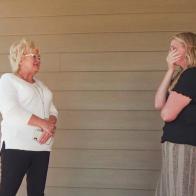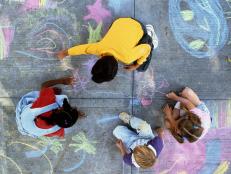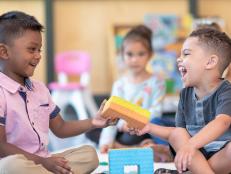How I’m Filling in the Gaps While My Kids Learn Online
A former teacher's tips for homeschooling during Covid-19.


Compassionate Eye Foundation
Like many parents, I felt overwhelmed trying to figure out how to help my kids navigate their new day when schools closed and switched to online learning to prevent the spread of coronavirus. Even though I had previously been a high school English teacher, suddenly becoming the teacher for my second and fourth grader was an adjustment—for all of us.
While my kids and their teachers transition into a new normal, I have been digging into my old teacher “bag of tricks” to fill in some of the gaps their new curriculum isn’t covering. For us, it helps create a daily routine, makes sure they are working on the skills that are essential for success in school, and it makes me feel better knowing that I can help my kids during such a crazy time.
Here are a few things that have been working for us.
It’s important to note that, on any given day, if the extra work I’m giving my kids seems to be too stressful or isn’t working for us, we just cut it. Teachers are working hard; kids are working hard, and these are just a few ways you can help.
Independent Reading

Miguel Sanz
This is a great addition to your kid’s school routine because it helps them become better readers and gives you a bit of a breather during the day. For this activity your kids will need a notebook—this will become their independent reading journal–as well as a pencil, a timer and books. Start by helping your child choose a book they can easily read on their own. For older kids, this should be a chapter book and, for children who are not quite reading yet or are early readers, find age-appropriate audiobooks or podcasts that read to your child. Remember, your child hearing others read is just as important as having them read on their own.
When it’s time for independent reading, have your child sit in a comfortable place with their book and set a timer for 20 minutes. When time is up, have your child take out their independent reading journal and ask them to write the date, the number of pages they read and then give them a short writing task. You will need to adjust this for younger readers/writers–just remember to make it work for you!
I try to change the prompts a few times a week. The key is to keep it simple and allow your kids to share what they’ve read in an age-appropriate way. Here are a few examples of what I’ve been using, and there are tons of other free resources for independent reading prompts online.
- Write a three-sentence summary of what you read.
- What are two questions you still have after reading?
- Which character is your favorite and why? Is there a character you don’t like? Why?
- Explain the setting in two sentences. Is this similar to any other books you have read?
- Are there any words you didn’t know or understand? Write them down and guess their meaning.
Review What I Can’t Teach

Jeffrey Coolidge
As a former English teacher and a self-proclaimed “person who is bad at math,” I don’t always understand the way my kids are learning math. So, for me, the best way I can support them is by giving my kids opportunities to review what they have already learned and to strengthen those skills. I’ve found a few workbooks that cover the math skills they already know—practice makes perfect–and pulled worksheets and online math games from free and subscription-based educational websites. These daily math reviews are giving my kids a much-needed boost to their confidence and the online math games are a welcome break in the day for all of us.
Collect Resources

Peter Cade
From virtual field trips and educational podcasts to acting and art lessons, there are many amazing free resources that are now available for students of all ages. The only problem is keeping track of these opportunities so your kids can take part in them. So, to keep myself organized, I’ve created a note on my phone where I copy the links to all of the resources I see shared online or on social media. Teachers and other parents have been great at sharing and, if I keep myself organized, I can incorporate these activities into our school day.
































































